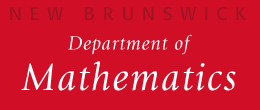Mathematics Placement Advice |
Mathematics Undergraduate Program |
The placement process
The Placement Test in Mathematics measures readiness for mathematics courses offered by the Rutgers-NB Mathematics Department at various levels: algebra, pre-calculus, and calculus. Students entering Rutgers-NB are required to take the Rutgers Placement Test in Mathematics, with certain exceptions for AP tests or transfer credit (see more).
Students may not enroll in any mathematics course unless they meet the prerequisites by suitable placement: that is, by the placement test, an appropriate AP Calculus exam score, or with a grade of C or better in an approved transferred course.
Information regarding special circumstances may be obtained by contacting the Head Mathematics Advisor at advisor@math.rutgers.edu. However most mathematics placement advice needed by students new to Rutgers-NB will be found in this document,
Note
All students should take math courses needed for graduation or required by their anticipated major as soon as possible. While the results of the placement exam will be honored months or even years later, the knowledge they represent may no longer be totally available. Our placement tests represent your readiness to take a certain level of course at the time the test was taken.
The study of mathematics is cumulative, and each level builds on the one before it.
Details Here (Placement Process)
Liberal arts math courses
The liberal arts math courses Math 103, Math 104, and Math 106 are college credit bearing mathematics courses designed to satisfy a quantitative distribution requirement. For prerequisites and descriptions see here
These courses may not be used as an elective for the math major or minor.
Math 103 and 106 are offered fall, spring, and summer, while Math 104 is offered only in the fall and spring.
Details Here (Liberal Arts Math)
Precalculus courses
The precalculus course is available as a one-semester course (Math 115) or a two-semester course (Math 111-112). The two-semester course is slower paced and reviews some of the more rigorous algebraic topics: the one semester course is much faster and assumes that the student has a firm grasp of intermediate algebra.
Details Here (Precalculus Courses)
Calculus courses
There are two sequences of courses in calculus:
- Math 151-152
- Calculus for Math and Physical Sciences
- Required for engineering students and for students majoring in biochemistry, computer science, mathematics, and the physical sciences.
- Also suitable for students in Life Sciences, Economics, and other disciplines needing advanced mathematics courses
- Many of these majors also require Math 251, a third term of calculus.
- Math 135-136 and Math 135-138
- For students who do not intend to take further mathematics courses.
- The usual sequence is 135-136; 138 emphasizes the use of mathematical models in biology.
Details Here (Calculus Courses)
Switching tracks in calculus
Students sometimes need to switch from the 135-136/138 track to the 151-152 track because of a change in major or for other reasons.
Students may use Math 135 in place of Math 151 to satisfy the prerequisite for admission to Math 152 but should consult our Head Advisor about their plans. Many students have done this successfully but it is not easy.
Students who have already taken 136 or 138 and need 152 normally retake 152 with E-credit (no additional graduation credit). There are other options but both of these courses differ substantially from 152.
Details Here (Switching Tracks)
Differential equations
The Department offers two courses in differential equations:
- Math 252, a 3-credit course intended mainly for mathematics majors and minors.
- (Introduction to Linear Algebra) Math 250 is a prerequisite for Math 252.
- Math 244, a 4-credit course taken by engineering students and some physics majors
- Students from engineering may use Math 244 in place of Math 252 to fulfill a requirement for the mathematics major or minor.








